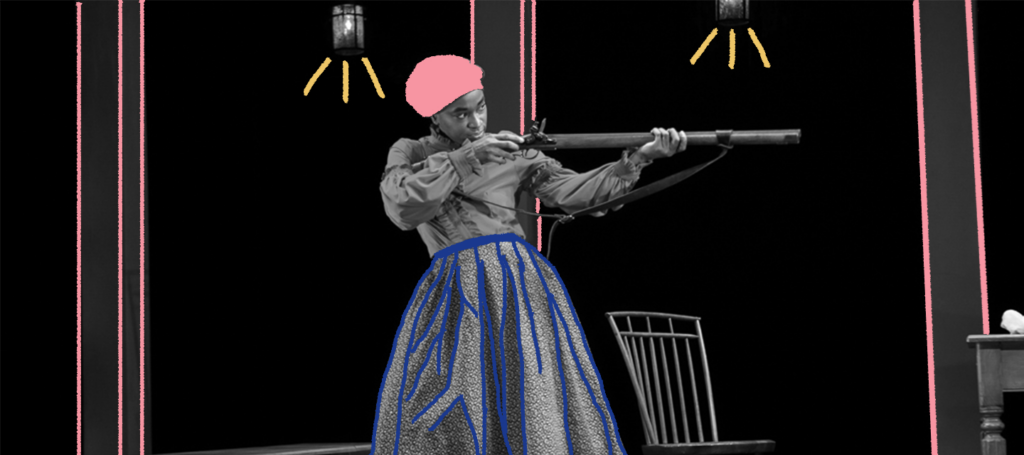


‘Confederates’ Mightily Walks Down the Elusive Road to Freedom
Time sways back and forth like a Newton’s Cradle in Dominique Morisseau’s new biting comedy Confederates, where the differences between understanding, or experiencing racism from a historical, intellectual context, and being confronted with it in a visceral way, become stark clear.
The play tackles the subject of slavery in the raw, as well as its reverberation through time in the form of institutional racism, from the perspective of two black women.
In the present, there’s Sandra (a commanding Michelle Wilson who conducts the emotions of everyone in the audience like a maestro): a renowned professor of political science who becomes the target of a hate crime when someone posts a picture on her door, in which her face is photoshopped onto an archive image of a Black slave woman breastfeeding a white baby.
In the past, there’s Sara (Kristolyn Lloyd who embodies the duality of vulnerability and strength with delectable ease): the young slave woman who learned to read (illegally) and took her chances during the Civil War to help with the efforts towards emancipation.
Morisseau posits a simple question for both Sandra and Sara: how to get free?
Three additional actors play doubled roles as supporting characters around Sandra and Sarah, completing a parallel structure very much like an elegant mathematical equation. Elijah Jones gives solid portrayals of both Sara’s brother Abner, a contraband turned Union soldier whose threshold of pain betrays his conviction when Sara stitches him up, as well as, with a swift on-stage costume change, Malik, Sandra’s over-achieving albeit overconfident student who doesn’t think his Black professor gave him a fair chance.
Similarly, Kenzie Ross is an equal amount of cringe-worthy and soul-affirming as both Sara’s overly enthusiastic mistress/childhood playmate/possible love interest Missy Sue, and Sandra’s type-A assistant who’s quite aware of her white privilege: her biggest problem is losing her financial aid because her parents make too much money.
Finally, Andrea Patterson is a force of nature as Luanne, isolated by both her masters and fellow slaves because she “keeps the Master’s bed warm”, as well as Jade Banks, Sandra’s colleague who wishes for more kinship rather than potential rivalry from her only Black colleague.
Unlike most of Morisseau’s oeuvre, Confederates is unique in its heightened style. There’s a juxtaposition of grounded realism in the present-day scenes, alongside high-comedy in the period scenes where she caricaturizes Gone With the Wind stereotypes. And yet, even in the most unhinged moments, the characters are as complex as the issues they illuminate are devastating.
So what does freedom really mean? What invisible shackles linger like an agonizing phantom limb even in our relatively progressive 21st century, where many of us make a conscious effort to fight against racial injustice?
“I have to make myself small so they don’t think I’m angry,” Malik offers plainly, as does Sandra, in a moment of vulnerability: “I feel that I owe something to myself, to women, to…the future, even, to make sure that I am not disposable here. And that means carrying myself with a demeanor that doesn’t allow for much crack in the foundation.”
So again: how to get free? Is there a simple solution to it? Sandra’s father, a mathematician, holds a romantic notion that, “if you can teach people to solve for X around the world, they can solve hunger and injustice too.” And yet, it seems that everywhere she turns, there isn’t a correct way for Sandra to play the part of a Black woman in an institution where racism is an insidious, erosive thing, where the shackles are soft but unyielding.
Sara’s road to freedom was through learning how to read, and fast forward to the present, Sandra has armed herself to the teeth with political theories using her ever-sharp mind. But why should freedom be earned at all, to begin with? “Nature ain’t no slave. It moves to its own rhythm,” Luanne laments to Sara, because racism, in the end, is simply unnatural; because why should there be double standards, where some of us had to hone immaculate skills in order to be free, while others are born with it, without ever having to think of it as a “privilege.”
Speaking of privilege, I was in awe of how Confederates anatomized allyship. It’s a dangerous thing, allyship – an anglerfish that pulls you in with promises of light at the end of the tunnel, yet ends up clutching you in its jaw. Because allyship with condescension, with expectation for gratitude, hurts like saltwater on an open wound. “It’s because you don’t trust me, is that it?” Missy Sue snaps at Sara when the latter is reticent about her support. But here’s what I wish white allies would realize: for people who have inherited generations of trauma from racial injustice, trust is a luxury, a gossamer thread between sanity and despair.
“I wants freedom by my own deliverance,” Sara says, tired of “bein’ tugged this way and that” when nobody had any directions. Freedom, after all, shouldn’t ever have been an allowance, but the birthright of every human being under the sun.
It’s devastating to witness a play and recognize how close to home it all hits. Each one of us, whether in the thick of being a target of prejudice and oppression, or being an ally to those in need, each carry an impossible task, and we carry on, holding onto a glimmer of hope at the bottom of Pandora’s box.
Because we must carry on.
Keep Reading

A Need for Black Criticism As Black Art Rises in Theater
Attending theater press performances has made me extremely aware of the lack of diversity in dramatic criticism. Every time I arrive at a show on or off-Broadway for a press evening, I scan the room like clockwork, looking for the other critics I am lucky enough to be in attendance with. Since the reopening of […]
Read More
Unraveling the Secrets of the Self Through ‘English’
I feel different when I speak English. In middle school, we had a “wai jiao”, a foreign guest teacher who’d come hang out with us a few times a year: Canadian Stephen (he pronounced it steh-fun) had dirty blond hair and frequent stomach problems. Stephen described English as “simple, and elegant.” For me, it was […]
Read More












